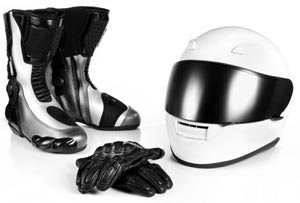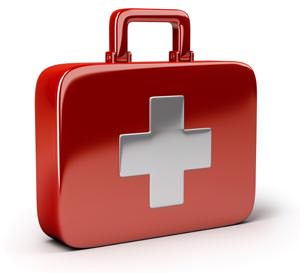victims for over 25 years.
Motorcycle Law: Chapter 1
You’re The Proud Owner of a New Motorcycle … Now What?
Whether this is a childhood dream-come-true or simply your next set of two wheels to get you from Point A to Point B, owning and riding a motorcycle is a big deal. And before you jump on, rev it up, and drive to your nearest pal’s house to show it off, there are a few things you should know and do.
This chapter covers the following:
- Types of insurance you should get
- Riding Gear
- Rider Safety
- First Aid
- BikerDown
Types of Insurance You Should Get
Here is an overview of the various types of insurance that you should purchase:
At a minimum, you should purchase $250,000 of UIM insurance coverage. If you can afford more, you should have it. Additionally, if you own a home, you should get an uninsured/underinsured motorists umbrella policy for $1 million.
- Liability Coverage Liability insurance covers damages to another person’s property resulting from an accident that you cause. (Your liability coverage doesn’t pay for any of your expenses related to any accident. It pays for damage and injuries that you cause.)
- Collision Coverage Collision insurance protects your motorcycle when it is involved in a crash with another vehicle or a stationary object. (But remember: this coverage will not pay for any medical bills you incur.)
- Comprehensive Coverage Comprehensive insurance doesn’t give you complete coverage, contrary to what its name might indicate. Comprehensive insurance just covers damages to your vehicle not caused by a collision and motorcycle owners can be surprised by how much this can encompass. Comprehensive coverage generally falls under “acts of God or nature”, that are typically out of your control when driving – a spooked deer, a heavy hailstorm, a carjacking, etc.
- MedPay Medical Payment Coverage, also called MedPay, is a premium that your insurance company must offer you. In fact, in order to forfeit the coverage, you must sign a waiver. The value of the coverage can range from $5,000 to $100,000. This coverage can be used to pay for first responders, such as ambulance companies. It also covers emergency room bills or any other medical bills related to your injury as a result of your accident, whether or not you were at fault. Do not waive this coverage!
- Underinsured (or Uninsured) Motorist Coverage Colorado only requires that drivers have $25,000 in liability coverage. So, when you’re out on the roads, you should assume that everyone only has $25,000 to give you if they hit you. For victims of motorcycle accidents, that likely won’t even cover your first day in the hospital. On the other hand, if you purchase UIM as part of your own insurance policy, your insurance company will pay you for:
- Lost wages
- Past and future medical expenses
- Any damage arising from the accident (with the exception of property damage)
- All economic and noneconomic loss, which includes pain and suffering
Consider this true story from the O’Sullivan Law files:

Samuel was riding his motorcycle in a residential area and was hit by a driver who then fled the scene. Samuel sustained severe injuries and was out of work for two months. The driver of the car was caught but he only had $25,000 worth of insurance coverage. Luckily, Samuel had Uninsured/Underinsured Motorist (UIM) coverage and was insured for up to $250,000. Without that coverage, Samuel would not have been able to pay his medical bills. His life would have been forever altered by another driver’s carelessness.
Why do insurance agents often steer auto and motorcycle drivers away from this coverage? Insurance companies and agents are pressured to keep premiums as low as possible. Also, many people function under a popular misconception: They think that, if you have health insurance, you don’t need UIM. But that’s not true. First, think of your health insurance deductibles and co-pays. In some severe cases, those expenses alone are enough to stress a person’s finances.
Second, health insurance doesn’t cover everything that UIM covers. (See list above for what is covered with Uninsured/Underinsured Motorist Coverage),
Health insurance and UIM insurance are completely different.
A good rule of thumb for motorcycle insurance is to purchase as much as you can and make absolutely certain that you have Uninsured/Underinsured Motorist Coverage.
In summary, you should have the following coverage before you ride your motorcycle:
- As much liability, collision and comprehensive insurance as you can afford. (Read more about these types of insurance by clicking here.)
- A minimum of $250,000 Underinsured Motorist Coverage (UIM)
- Medical Payments Coverage
- An uninsured/underinsured motorists umbrella policy of $1 million if you own a home.
Riding Gear
 When you purchase your motorcycle, roll a few items into the cost, just as if they came with the bike. You wouldn’t buy a motorcycle without a clutch. Don’t buy one without the proper riding gear, such as:
When you purchase your motorcycle, roll a few items into the cost, just as if they came with the bike. You wouldn’t buy a motorcycle without a clutch. Don’t buy one without the proper riding gear, such as:
- Full-face helmet, including face and jaw protection
- Motorcycle boots
- Riding jacket and pants
You might even consider the newest technologies out there, such as a riding jacket that comes equipped with an airbag. These state-of-the-art jackets look no different than professional racing jackets and come in different seasonal variations.
Join BikerDown
BikerDown is a non-profit organization that was established in 2011 with a mission to assist motorcycle accident victims. BikerDown provides emotional support to family members of injured or killed riders, medical equipment and even financial support (when possible) or advice to help victims keep creditors at bay as they recover.
When you become a member of BikerDown, you not only join a community that helps injured riders, but you help yourself and your family, as well, because members can upgrade their membership to include Aflac Insurance. This is important because, if you have a family depending on you, you have a duty to make sure that they can pay for your care if you are permanently hurt or even killed. Even something as simple as road rash can take days or weeks to heal and, depending on your line of work, that could be devastating to your financial situation. The optional Aflac Accident policy as part of your BikerDown membership can give you the added financial assistance you need to recover.
The O’Sullivan Law Firm is a proud supporter of BikerDown. To learn more, visit their website.
Protect Yourself: Take a Rider Safety Class
Take a rider safety class and get the motorcycle endorsement for your driver’s license. In Colorado, there are many Motorcycle Safety Foundation-approved sites and Motorcycle Operator Safety Training (MOST) courses, which are accredited by the state.
To find the MOST-certified training courses near you, visit:
http://www.coloradodot.info/programs/live-to-ride/most-trainers.html
Learn about adding a motorcycle endorsement to your driver’s license here:
http://www.colorado.gov/cs/Satellite/Revenue-MV/RMV/1190796317325
Protect Your Friends: Take First Aid Training
 Often, accidents happen when riders are together. You can protect your buddies if you know some first aid basics. Learn about the types of wounds you might see in an accident and how you can help an injured friend while you wait for paramedics. You can generally find these courses by inquiring at bike shops or at a nearby Red Cross.
Often, accidents happen when riders are together. You can protect your buddies if you know some first aid basics. Learn about the types of wounds you might see in an accident and how you can help an injured friend while you wait for paramedics. You can generally find these courses by inquiring at bike shops or at a nearby Red Cross.
To-Do Checklist
When you get your motorcycle:
- Get the proper insurance.
- Purchase the appropriate riding gear.
- Take a motorcycle safety course.
- Take a first aid course.
Free Consultation
Search For
Recent Articles
- Careless Driving Results in Serious Injury Near Cherry Creek
- Serious Injury Reported in Early Morning Collision at Cherry Creek Intersection
- Two Seriously Injured in Collision at Wet Denver Intersection
- Possible DUI Incident Involving Passenger Car Reported on I-70 in Northeast Park Hill
- Possible DUI Involved in Denver Collision Near N Moline St and E MLK Jr Blvd
Categories
- Arvada
- Aurora
- Auto Accident eBook
- Auto Insurance
- Bicycle
- Bicycle/Motorcycle Accidents
- Bodily injury
- Car accidents
- Centennial
- Colorado
- Colorado Legislature
- community
- Concussion
- Denver
- Denver Metro Motor Vehicle Accidents
- distracted driving
- DUI Accidents
- Englewood
- Events
- Flood Insurance
- Fort Collins
- Highlands Ranch
- Hit and Run
- In The News
- insurance companies
- Lakewood
- Littleton
- Marijuana DUI
- Motorcycle Accidents
- Motorcycle Insurance
- Motorcycle Law eBook
- Motorcycles
- Newsletter
- Pedestrian
- Personal Injury Law
- Press Release
- Safe Driving
- Safety
- Scooters
- technology
- Thornton
- Tips
- Uncategorized
- vibrio vulnificus bacteria
- Videos
- Westminster
- Winter Driving
- Wrongful Death
Archive
- April 2025
- March 2025
- February 2025
- January 2025
- December 2024
- November 2024
- October 2024
- September 2024
- August 2024
- July 2024
- May 2024
- April 2024
- March 2024
- February 2024
- January 2024
- December 2023
- November 2023
- October 2023
- September 2023
- August 2023
- July 2023
- June 2023
- May 2023
- April 2023
- March 2023
- February 2023
- January 2023
- November 2022
- September 2022
- April 2022
- March 2022
- February 2022
- January 2022
- December 2021
- November 2021
- October 2021
- September 2021
- August 2021
- July 2021
- June 2021
- May 2021
- April 2021
- January 2021
- December 2020
- November 2020
- October 2020
- September 2020
- August 2020
- July 2020
- June 2020
- May 2020
- April 2020
- March 2020
- February 2020
- January 2020
- December 2019
- November 2019
- October 2019
- September 2019
- August 2019
- July 2019
- June 2019
- May 2019
- March 2019
- February 2019
- January 2019
- December 2018
- November 2018
- October 2018
- September 2018
- August 2018
- July 2018
- June 2018
- May 2018
- April 2018
- March 2018
- February 2018
- January 2018
- December 2017
- November 2017
- October 2017
- September 2017
- August 2017
- July 2017
- June 2017
- May 2017
- April 2017
- March 2017
- February 2017
- January 2017
- December 2016
- November 2016
- October 2016
- September 2016
- August 2016
- July 2016
- June 2016
- May 2016
- April 2016
- March 2016
- February 2016
- January 2016
- December 2015
- November 2015
- October 2015
- September 2015
- August 2015
- July 2015
- June 2015
- May 2015
- April 2015
- February 2015
- December 2014
- November 2014
- October 2014
- September 2014
- July 2014
- June 2014
- May 2014
- April 2014
- March 2014
- February 2014
- January 2014
- October 2012
- September 2012
- August 2012
- July 2012
- February 2012
- March 2011
- October 2010